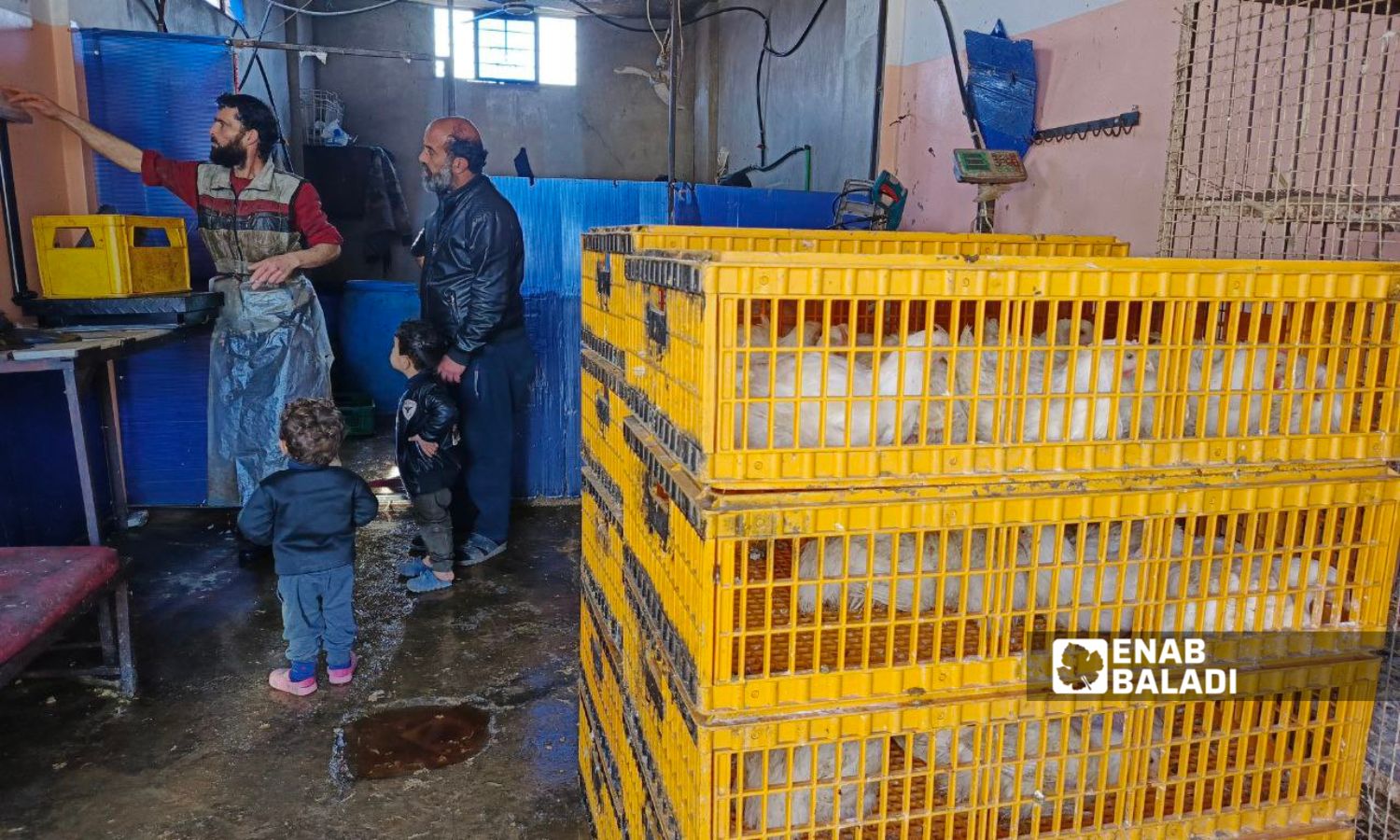



Daraa – Halim Muhammad
Most poultry farmers in Daraa province, southern Syria, have suffered financial losses after flocks were hit by a new wave of Newcastle disease, leading to the deaths of entire flocks.
The outbreak has prompted prices for small chickens to be offered at lower rates to match market prices, especially with the opening up of Syrian areas to each other following the fall of the previous Syrian regime.
Poultry farmer Anas al-Mefalani, in the town of Nahta in the eastern Daraa countryside, lost about 234 million Syrian pounds (20,000 US dollars) after losing four flocks of chickens, consisting of over 25,000 birds.
Al-Mefalani told Enab Baladi that his breeding flocks were infected with the Newcastle disease, despite taking precautions such as disinfection and preventive vaccination.
Newcastle disease is a highly contagious respiratory disease similar to avian influenza, affecting poultry and birds in general, and spreads through direct contact between birds or through bird feces or food and water contaminated with the virus.
Veterinarian Ayman al-Naqawa stated to Enab Baladi that the poultry flocks suffered a new strain of Newcastle disease, which has broken the immunity among the birds and did not respond to vaccination.
According to his estimates, the mortality rate was between 60% and 90% in most farms and reached 100% in some farms.
He added that the current wave of the outbreak has ended, following a decline in breeding flocks, as they prepare for new flocks intended for the upcoming Ramadan (at the end of February).
The head of the Veterinary Doctors Syndicate in Daraa, Hussein al-Zoubi, attributed the outbreak of disease in poultry farms in Daraa to the dilapidated infrastructure of the farms and the high cost of feed and medications, which led farmers to neglect essential preventive measures to avoid the spread of the disease.
Al-Zoubi added to Enab Baladi that some farmers did not follow health guidelines, including maintaining a time interval between breeding each flock, disposing of waste, cleaning and disinfecting the area, and some of them became lax in oil vaccination, which involves injecting each bird through a specialized veterinarian.
After the fall of the Assad regime on December 8, 2024, most Syrian areas opened up to each other, with chickens from northern Syria entering the market in southern Syria, leading to a decrease in prices.
The price of chicken per kilo is around 30,000 Syrian pounds for consumers, while the cost of one kilogram at the farm is also 30,000 pounds.
Poultry farmer Anas al-Mefalani stated that farmers buy the necessary feed for the flocks all at once, adding that he bought one ton for 9 million Syrian pounds (782 US dollars), while the price has dropped to 6 million pounds (521 US dollars), affected by the improvement of the Syrian pound against the dollar, with each dollar equating to 11,900 Syrian pounds.
Al-Mefalani noted that some farmers approached the Ministry of Agriculture to seek redress for the financial losses incurred due to falling prices, but received no responses.
Al-Mefalani is preparing for a new production cycle after the feed prices have been unified, expecting that the cost of one kilo of chicken will reach 20,000 Syrian pounds.
Some slaughterhouses have offered small-sized birds at a price of 10,000 Syrian pounds each (where 10 chickens cost 100,000 pounds), with each chicken weighing no more than 900 grams. This offer has gained popularity among some residents due to the lower price.
Hussein al-Zoubi, the head of the Veterinary Doctors Syndicate in Daraa, stated that the reasons for the existence of chickens at these weights stem from the farmers’ desire to dispose of the flock out of fear of disease and also to prepare for a new flock that will enter the markets in Ramadan.
He emphasized that Newcastle disease is not a zoonotic disease and that this outbreak does not spread through the consumption of infected meat.
According to statistics revealed by an employee in the Animal Wealth Directorate in Daraa to Enab Baladi, the number of licensed poultry farms in the province has reached 900, with 125 licensed for chickens and 97 for eggs.
Meanwhile, the number of unlicensed farms has reached 388, with 125 operating for chickens and 110 for eggs.
if you think the article contain wrong information or you have additional details Send Correction